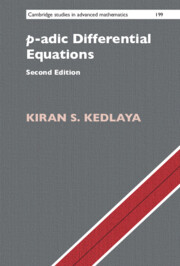Book contents
- Frontmatter
- Contents
- Preface
- Acknowledgments
- 0 Introductory remarks
- Part I Tools of p-adic Analysis
- Part II Differential Algebra
- 5 Formalism of differential algebra
- 6 Metric properties of differential modules
- 7 Regular and irregular singularities
- Part III p-adic Differential Equations on Discs and Annuli
- Part IV Difference Algebra and Frobenius Modules
- Part V Frobenius Structures
- Part VI The p-adic local monodromy theorem
- Part VII Global theory
- Appendix A Picard–Fuchs modules
- Appendix B Rigid cohomology
- Appendix C p-adic Hodge theory
- References
- Index of notation
- Subject index
7 - Regular and irregular singularities
from Part II - Differential Algebra
Published online by Cambridge University Press: 06 August 2022
- Frontmatter
- Contents
- Preface
- Acknowledgments
- 0 Introductory remarks
- Part I Tools of p-adic Analysis
- Part II Differential Algebra
- 5 Formalism of differential algebra
- 6 Metric properties of differential modules
- 7 Regular and irregular singularities
- Part III p-adic Differential Equations on Discs and Annuli
- Part IV Difference Algebra and Frobenius Modules
- Part V Frobenius Structures
- Part VI The p-adic local monodromy theorem
- Part VII Global theory
- Appendix A Picard–Fuchs modules
- Appendix B Rigid cohomology
- Appendix C p-adic Hodge theory
- References
- Index of notation
- Subject index
Summary
In this chapter, we reconstruct some of the traditional Fuchsian theory of regular singular points of meromorphic differential equations. We first introduce a quantitative measure of the irregularity of a singular point. We then recall how in the case of a regular singularity (i.e., a singularity with irregularity equal to zero), one has an algebraic interpretation of the eigenvalues of the monodromy operator around the singular point, using the notion of exponents. We then describe how to compute formal solutions of meromorphic differential equations and sketch the proof of Fuchs’s theorem: the formal solutions of a regular meromorphic differential equation all converge in some disc. We finally establish the Turrittin–Levelt–Hukuhara decomposition theorem, which gives a decomposition of an arbitrary formal differential module analogous to the eigenspace decomposition of a complex linear transformation. The search for an appropriate p-adic analogue of this result will lead us in Part V to the p-adic local monodromy theorem.
- Type
- Chapter
- Information
- p-adic Differential Equations , pp. 123 - 140Publisher: Cambridge University PressPrint publication year: 2022



